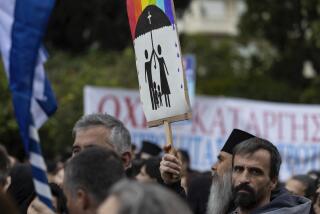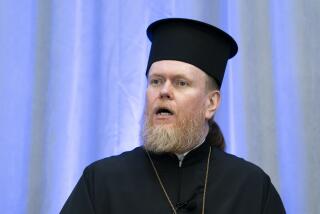Church Council Leaders Meet in Moscow : Events Confirm Soviets’ New Openness to Religion
- Share via
The newly benevolent view of religion in the Soviet Union, part of that country’s democratic reforms, was reaffirmed recently at Western religious conferences and at an unprecedented meeting of World Council of Churches leaders in Moscow.
A long-awaited proposal for a Soviet law on freedom of conscience is scheduled to be debated next month by the Supreme Soviet, the national legislature, according to the New York-based Appeal of Conscience Foundation headed by Rabbi Arthur Schneier.
The World Congress of Religious Liberty, meeting last week in London, honored Schneier and Konstantin Kharchev, the immediate past chairman of the Soviet Council of Religious Affairs, for their respective efforts to encourage religious freedom.
Will Maintain Course
Schneier said that when he was in Moscow three weeks ago he was assured by the new chairman of the Council of Religious Affairs, Yuri Khristoradnov, “that he will maintain the same course and policy” on religious bodies.
From his numerous visits to the Soviet Union, Schneier said, “I am deeply impressed by the change (Soviet leaders) have introduced and even more by the . . . new respect for religious belief and religious leaders that I have found.” Schneier is senior rabbi of Manhattan’s Park East Synagogue.
That impression was conveyed also in Moscow during the annual 10-day meeting of the World Council of Churches’ 150-member Central Committee, which ended last week.
According to Religious News Service, Soviet Prime Minister Nikolai Ryzhov, speaking through an interpreter at a Kremlin reception, told World Council representatives that churches in the Soviet Union have an important role to play in “humanizing all spheres” of society.
First Soviet Meeting
Although major church bodies in the Soviet Union have been World Council members for a number of years, it was the first time the council’s main governing body has met inside Soviet borders.
“The very fact that this meeting is taking place in the capital of the Soviet Union cannot but testify to the great changes our society is living through,” Ryzhov said.
World Council General Secretary Emilio Castro, a Uruguayan Methodist, responded that recent developments “have introduced to all the vocabularies of the world two words-- glasnost (openness) and perestroika (economic restructuring). These words not only evoke general interest but are also heard in the prayers of the many religious believers of the Earth.”
The opportunity to witness Soviet perestroika “allows us to look into the future with a renewed confidence,” Castro said.
Gospel Hymns Sung
Members of the ecumenical council made a daylong visit to the Trinity Monastery in Zagorsk, where they joined crowds of worshipers celebrating the feast of St. Sergius, founder of the monastery. They also crowded into Moscow Baptist Church with local members for a Communion service, which included the singing of American gospel hymns with Russian lyrics.
Meanwhile, in Wheaton, Ill., a Ukrainian Baptist told the Slavic Gospel Assn.’s international conference recently that atheism will no longer will be a required course in universities in his homeland.
Instead, an elective “introduction to religion” class will take a historical approach to both atheism and Christianity, said the Rev. Yakov K. Dukhochenko, superintendent of the All-Union Council of Evangelical Christians-Baptists of the Ukraine.
Dukhochenko said such a course is already being taught at Kiev University by an Orthodox priest. “This is God’s timing for our country,” he told the conference.
More to Read
Sign up for Essential California
The most important California stories and recommendations in your inbox every morning.
You may occasionally receive promotional content from the Los Angeles Times.













